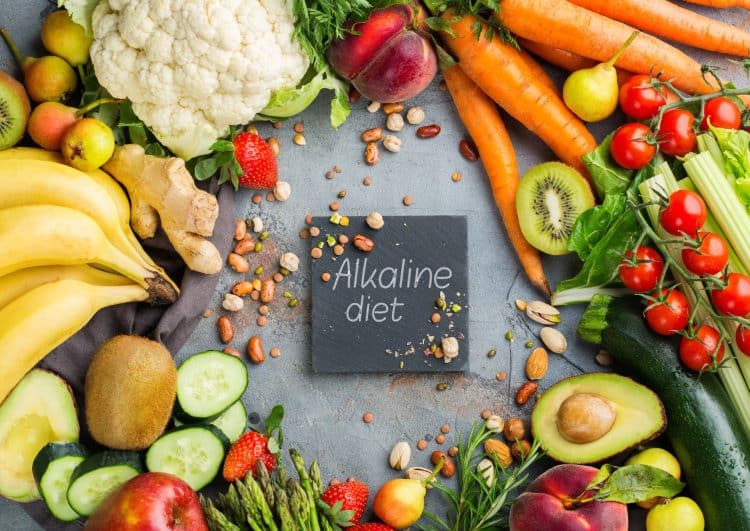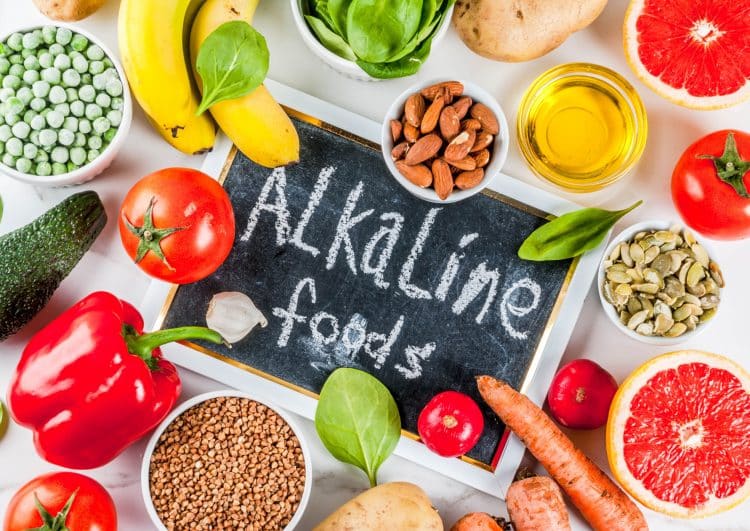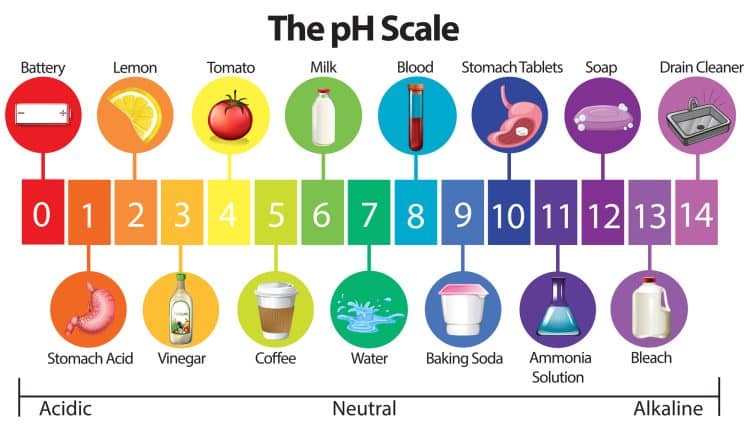The fitness world welcomes new diets every year. However, you must distinguish between fleeting trends and truly effective nutritional plans to ensure you’re not wasting time.
The alkaline diet is among the most popular diets, which started gaining prominence in the late 20th and early 21st century. It centers around the idea that certain foods can affect the body’s pH balance and thus impact overall health and well-being.
In this article, we explore the basics of the alkaline diet, the characteristics of alkaline and acidic foods, the comprehensive list of alkaline foods and their importance, and critical analysis of this diet. So, without further ado, here is everything you need to know about the alkaline diet.
Introduction to the Alkaline Diet
The alkaline diet, also known as the acid-alkaline or alkaline ash diet, centers around the idea that eating certain foods can lower your body’s pH.
But why is the body’s pH level so important?
I’m glad you asked.
Our body converts foods and beverages into calories using a process called metabolism. Metabolism is a chemical process essential for maintaining various vital bodily functions, such as breathing, circulating blood, repairing cells, and digesting food.
Whenever the body converts food into energy, it leaves behind an “ash” residue called metabolic waste. Metabolic waste consists of acidic, neutral, or alkaline ash.
It is believed that acidic ash can lead to several health conditions, whereas alkaline ash can lower vulnerability.
The alkaline diet advocates believe that eating alkaline foods can help lower the acidity or alkalinity of bodily fluids, including blood and urine.
A review published in the Journal of Environmental and Public Health found evidence suggesting an alkaline diet’s benefits in reducing morbidity and mortality from chronic diseases. (1)
The alkaline diet promotes a higher intake of alkaline-producing foods like fruits and vegetables while limiting acidic food consumption, including meat and processed foods. This diet’s emphasis on whole foods like fruits and vegetables aligns with general fitness recommendations and is endorsed by celebrities like Gwyneth Paltrow, Jennifer Aniston, Kirsten Dunst, Victoria Beckham, and Jared Leto.
That said, the direct impact of the alkaline diet on exercise performance and muscle fatigue requires further research.
The Alkaline Foods List
Alkaline foods can supposedly help maintain the body’s ideal pH balance. Here is a comprehensive breakdown of alkaline foods with a focus on whole foods that can be added to a fitness regimen:
Fruits
Fruits are known for their high vitamin, mineral, and antioxidant content, a centerpiece of the alkaline diet. Notable alkaline fruits include:
- Despite their acidic taste, lemons and limes are highly alkalizing in the body.
- Watermelon, with its high water content, is excellent for hydration.
- Avocado is an excellent source of healthy fats and alkalizing nutrients.
Vegetables
Most vegetables are alkaline, making them a great source of carbohydrates, minerals, and antioxidants on an alkaline diet.
- Leafy greens like spinach, kale, and Swiss chard are known for their high mineral content, particularly magnesium.
- Root vegetables like beets and sweet potatoes offer complex carbohydrates for sustained energy.
Nuts and Seeds
Nuts and seeds are rich in plant protein, fiber, and healthy fats. They can also lower the risk of heart disease and diabetes. Healthy fats are essential for maintaining optimal body functionality.
- Almonds and chia seeds are some of the most popular nuts and seeds and provide sustained energy.
- Walnuts are packed with micronutrients like vitamin E, omega-3s, and manganese.
- Cashews are rich in magnesium, zinc, iron, copper, and phosphorus.
Others
Here are some other excellent alkaline foods that you can add to your diet regimen:
- Alkaline grains like quinoa and amaranth.
- Herbal teas made from ginger and lemongrass.
Meat and Chicken
Animal products like meat and chicken, dairy products, and processed foods are primarily acidic and are hence avoided on an alkaline diet.
That said, the conventional alkaline diet can be deficient in protein content. Hence, many people, especially fitness enthusiasts, prefer including small amounts of chicken and fish in their alkaline diet to promote muscle growth and repair.
Folks looking to incorporate meat and poultry into the alkaline-focused diet should choose lean cuts to limit acidity. Animal products must be balanced with alkaline-forming foods like leafy greens, vegetables, and fruits. Plus, you must consider the portion sizes. Opt for smaller meat portion sizes and larger vegetable and grain servings.
I have arranged the foods in different sections so you can pick the ones suitable for your meal plan. While vegetables, meats, and chicken are great for your main meals, fruits, nuts, and seeds are excellent snacking options to prevent cravings.
Incorporating these foods into your diet will not only align you with the alkaline diet principles but also boost muscle function, reduce inflammation, and enhance recovery.
pH Levels In The Body
Since we have spoken a lot about the pH levels in the body, below is an overview of the acidic, neutral, and alkaline levels to give you a better understanding.
The body’s pH level ranges between 0 and 14.
- Acidic: 0.0–6.9
- Neutral: 7.0
- Alkaline (or basic): 7.1–14.0
Alkaline diet advocates recommend monitoring the pH of their urine to ensure that it’s alkaline (over 7) and not acidic (below 7).
Nonetheless, assessing the body’s acidic or alkaline levels is more complex than this. The pH level can vary significantly in the body. Some body parts are more acidic by nature, while others are alkaline. For example, the stomach is generally acidic with a pH of about 1.5–2.0, as it needs to break down the solid food you eat. Conversely, the blood is usually alkaline, with a pH of 7.35–7.45. If the blood’s pH falls below these levels, it can be fatal if left untreated for an extended period.
Science and Controversies Surrounding the Alkaline Diet
The alkaline diet is often a topic of hot debate in the health and fitness space. Here is what the science had to say about it:
Science Behind Alkaline Diet
The human body maintains a stable pH in the blood. However, the theory behind the alkaline diet is that consuming more alkaline-forming foods can help maintain this balance, improve overall health, and reduce the risk of contracting chronic health conditions.
A study published in Alternative Therapies in Health and Medicine concluded that an alkaline-forming diet can improve bone mineral density and muscle mass, provide protection from chronic illnesses, reduce tumor-cell invasion and metastasis, and effectively excrete toxins from the body. The study also touches on the benefits of alkaline water and the concept of earthing. (2)
A Journal of Nutrition study found that certain foods like meat, eggs, and cheese increase acid production, while fruits and vegetables are alkalizing. It notes that a Western diet high in animal products and low in fruits and vegetables can exacerbate metabolic acidosis. (3)
Controversies and Criticisms of the Alkaline Diet
Although the alkaline diet has some research supporting its claims, the scientific consensus on its overall effectiveness and impact on health is not uniform, and more research is needed in this area.
The human body naturally regulates its pH level through the kidneys and lungs, regardless of the types of food you eat.
One of the biggest criticisms people have with the alkaline diet is that food mostly affects the pH of urine. The body regulates its blood pH by excreting acids in the urine. However, its effects on the blood pH level are largely variable.
Proponents of the alkaline diet advise monitoring urine pH levels, but blood pH is the most significant factor responsible for overall health and wellness. The urine pH levels can be affected by several factors besides the diet, making the alkaline diet a suboptimal method of regulating your body’s pH levels.
Incorporating Alkaline Foods Into Your Diet
Adding more alkaline foods to your diet can complement your fitness goals. Here’s how you can do it effectively:
Start With Breakfast
Kickstart your day with an alkaline breakfast. Drink a smoothie with alkaline fruits like bananas, berries, and leafy greens such as spinach and kale. Remember, use almond milk instead of dairy milk, as it is more alkaline.
Snack Right
Opt for healthy, alkaline snacks like almonds, carrots, or cucumber slices instead of processed and packaged snacks. Besides being delicious, they are packed with nutrients that will help you get to your fitness goals.
Lunch and Dinner Ideas
Although the alkaline diet can boost your overall health, it can significantly limit your dietary choices. You must focus on a balance of vegetables and lean protein for the main meals.
A quinoa salad with mixed greens, avocado, cherry tomatoes, and a lemon-olive oil dressing can be an evergreen meal choice in your alkaline diet regimen.
Conversely, bodybuilding enthusiasts can include grilled chicken or fish in their lunch and dinner to ensure optimal protein content to promote muscle growth and repair. That said, you must ensure optimal portion sizing to maintain the meal’s overall alkalinity.
Hydration
Drinking water throughout the day is essential to ensure an optimal supply of nutrients throughout the body. Drinking a gallon of water daily also balances the electrolyte content, limiting the risk of dehydration.
Infuse cucumber or lemon into the water to make it more alkaline and delicious. It is also an excellent hack for people who have difficulty drinking around 16 glasses of water daily.
Use Herbs and Spices
Herbs and spices like ginger, turmeric, and cinnamon can add flavor to your meals without boosting acidity.
Challenges and Considerations of the Alkaline Diet
Here are a few challenges that you must address on an alkaline diet:
Limited Food Choices
The alkaline diet significantly limits certain food groups, particularly animal proteins, and grains, which are staples in many diets. Exploring new fruits, vegetables, and plant-based proteins can help keep your diet interesting.
Social and Lifestyle Adjustments
Eating out while following an alkaline diet can be incredibly challenging since most dishes contain acidic components. Planning ahead before eating out by going through a restaurant’s menu will ensure you don’t stray off the alkaline diet.
Balancing Nutrition Needs
Each individual has unique diet needs, and you must recognize that the alkaline diet is not for everyone. For example, folks trying to build muscle mass will be better off following a high-protein diet that involves eating animal food in each meal.
Start Small
The alkaline diet requires significant adjustments in your diet. Going cold turkey on acidic food overnight can lead to discomfort. You must give your body enough time to adjust to the new diet. Begin by adopting an alkaline breakfast, then gradually transition all your meals and snacks to acid-free options.
Common Myths and Misconceptions About the Alkaline Diet
Here are some of the most common myths surrounding the alkaline diet:
Alkaline Diet Drastically Changes Blood pH
Contrary to what many people believe, alkaline foods don’t drastically alter the body’s pH level, and there is no scientific evidence to prove it. The kidneys and respiratory system regulate the body’s pH level, and diet alone cannot do much in this regard.
Alkaline Foods Can Cure Diseases
According to a common misconception, the alkaline diet can cure diseases like cancer. Although there is research that supports the link between acid in food and cancer, it does not reflect blood acidity. It also doesn’t establish if dietary acid load causes cancer. (4)
Acidic Foods Are Unhealthy
The rise of the alkaline diet has led many people to believe that acidic foods are inherently unhealthy. On the contrary, many acidic foods are packed with vitamins and minerals, which can boost your overall health. The key to optimal health and well-being is balance and moderation, not the complete elimination of acidic foods.
Conclusion
As a fitness professional, I recommend this diet because it emphasizes whole, unprocessed foods rather than its alkaline-promoting properties. Adding more fruits, vegetables, and grains while limiting acidic foods in your diet improves your overall health, performance, and well-being, irrespective of their effect on the body’s pH.
Incorporate the alkaline foods listed in this article into your diet to notice firsthand the benefits of an alkaline diet.
If you have any questions about the alkaline diet or any of the foods mentioned in this article, drop them in the comments below, and I’ll be happy to help!
References
Fitness Volt is committed to providing our readers with science-based information. We use only credible and peer-reviewed sources to support the information we share in our articles.
- Schwalfenberg GK. The alkaline diet: is there evidence that an alkaline pH diet benefits health? J Environ Public Health. 2012;2012:727630. doi: 10.1155/2012/727630. Epub 2011 Oct 12. PMID: 22013455; PMCID: PMC3195546.
- Mousa HA. Health Effects of Alkaline Diet and Water, Reduction of Digestive-Tract Bacterial Load, and Earthing. Altern Ther Health Med. 2016 Apr;22 Suppl 1:24-33. PMID: 27089527.
- Rodrigues Neto Angéloco L, Arces de Souza GC, Almeida Romão E, Garcia Chiarello P. Alkaline Diet and Metabolic Acidosis: Practical Approaches to the Nutritional Management of Chronic Kidney Disease. J Ren Nutr. 2018 May;28(3):215-220. doi: 10.1053/j.jrn.2017.10.006. Epub 2017 Dec 6. PMID: 29221627.
- Wang R, Wen ZY, Liu FH, et al. Association between dietary acid load and cancer risk and prognosis: An updated systematic review and meta-analysis of observational studies. Front Nutr. 2022;9:891936. Published 2022 Jul 27. doi:10.3389/fnut.2022.891936
Tip: If you're signed in to Google, tap Follow.













